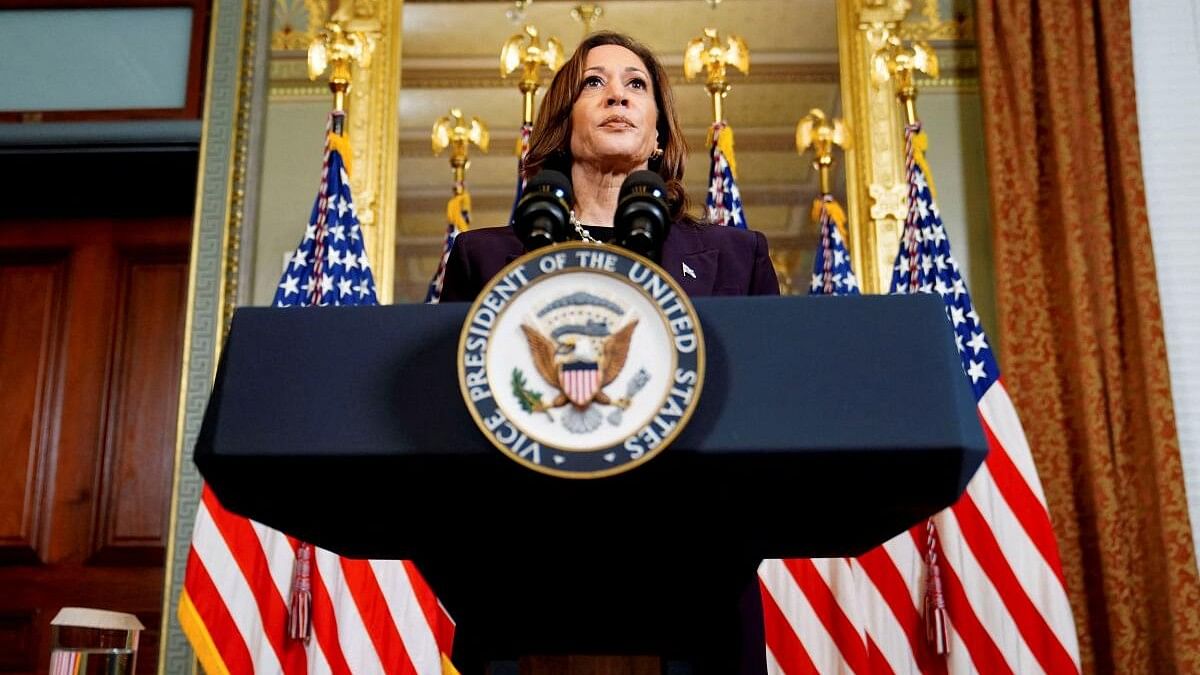
US Vice President Kamala Harris.
Credit: Reuters Photo
By Erika D. Smith
People don’t necessarily like to talk about it, especially now that Kamala Harris has raised hundreds of millions of dollars and is on the verge of becoming her party’s presidential nominee, but no Democrat from her home state of California has ever won the White House.
Former Governor Jerry Brown famously failed three times. More recently, Representative Eric Swalwell gave it a go, as did Harris herself. But conventional wisdom has long been that California, despite its status as America’s most populous and diverse state, is too liberal and therefore too out of touch with the values of most voters. Unsurprisingly, Republicans are already trying to depict Harris as a “radical leftist.”
So far, the attack hasn't had much effect on Harris’ historic candidacy. But sooner rather than later, the Oakland-born former resident of Los Angeles is going to have to decide what to do about her California-ness.
She can downplay it, treating the reputation of her home state as a liability and working to show undecided voters in swing states just how moderate she is. But Harris would be smarter to lean into who she is and what she believes as a Californian — and show how the state’s forward-looking values actually match up pretty well with America’s.
If that sounds politically risky, consider that much of what those in the Golden State want from government is exactly what mainstream Democrats from all states want — such as more affordable housing, guarantees on reproductive rights and tighter restrictions on guns.
Granted, the average Californian is undoubtedly more liberal than the average American. (There’s a reason the ban on plastic straws hasn’t caught on in all 50 states.) But what often gets lost in all the “Harris is a radical” talk is that Harris has never really been a radical.
Her record is, at best, mixed. She took on the big banks after the 2008 financial crisis and has supported the Green New Deal. But she also has proudly identified as San Francisco’s “top cop” and, when it mattered, refused to support legalizing cannabis. In fact, her policies often fell so short of the liberal ideals held by average Californians that, by the time she was running for president in 2020, 61 per cent of likely Democratic voters in the state wanted her to drop out. And she did.
Fast-forward four years, and the Republican Party has only moved further to the right, with the party’s Project 2025 essentially proposing a national abortion ban, as well as drastic cuts to the social safety net. (And I’m not even getting into the party’s blatant racism). In this context, the line between California Democrats and mainstream Democrats is looking more and more blurry.
Harris, to her credit, seems to be clear-eyed about the significance of this moment in history, and where she and her California-ness fit into it.
On Monday, during a stop at the Delaware campaign headquarters she took over from President Joe Biden, Harris laid out the stakes of the election as “two different versions” of the future. “Donald Trump wants to take our country backward to a time before many of our fellow Americans had full freedoms and rights,” she said. “But we believe in a brighter future that makes room for all Americans.”
At a raucous rally near Milwaukee on Tuesday, she elaborated, vowing to expand reproductive rights, defend affordable health care and build up the middle class. These are all California values. As are many of the other issues that Harris has been traveling the country talking about for several months: book bans in schools, attempts to whitewash Black history and discrimination against the LGBTQ+ community.
Harris has proved to be a strong messenger, able to connect with a broad array of voters. As a woman who is Black and South Asian, and the child of immigrants who rose through the rough-and-tumble ranks of California politics, surviving setback after setback to achieve first after first, Harris has a powerful story to tell.
For that reason, the attacks on Harris are sure to continue, although House Speaker Mike Johnson has told Republicans to keep it clean. “This has nothing to do with race,” he told Politico, even as many Republicans continued to call Harris a “DEI candidate.”
Talk like that makes it easier for Harris to lean into her California-ness and build a new kind of Democratic coalition. Her coalition would be younger and more diverse than the one she and Biden cobbled together in 2020, and more durable than the one Biden and former President Barack Obama knitted together in 2008.
The scaffolding of this coalition can be seen in the Obama-like excitement behind her candidacy, from the memes to the songs to the donations to the tens of thousands of voters and elected officials who have gathered on Zoom calls to help Harris be the first woman of color to become president.
In endorsing Harris on Tuesday, House Minority Leader Representative Hakeem Jeffries called her “a common sense leader who knows how to deliver real results for hard-working American taxpayers.” It just so happens she is also a Democrat from California.